
Catalog excerpts

Caio Vinícius Cintra Diniz Fábio Lúcio Mar tins Neto Marcelo Juliano Viviani Constance Dorise
Open the catalog to page 1
Caio Vinícius Cintra Diniz Fábio Lúcio Martins Neto Marcelo Juliano Viviani Constance Dorise Organic Coffee Manual
Open the catalog to page 2
Caio Vinícius Cintra Diniz Agronomic Engineer, MSc in Soils and Plant Nutrition Fábio Lúcio Martins Neto Agronomic Engineer, PhD in Phytotechnics Marcelo Juliano Viviani Zootechnist, Quality Management Specialist in Agribusiness Constance Dorise MSc in Food Identity Organic Coffee Manual Publication: Agrobiota Graphic design: Lasca Translation: Lionbridge
Open the catalog to page 3
1.2. Step-by-step guide to start production 5. Plant health management 5.1. Pest and disease management 2.3. Soil preparation and planting 5.2. Coffee tree pests and diseases 2. Establishing a coffee plantation 2.3.1. Soil correction and fertilization 5.2.1. Coffee leaf miner 2.3.2. Spacing and planting in the field 5.2.2. Coffee berry borer 5.2.3. Coffee leaf rust 5.2.5. American leaf spot 3.1. Practices to improve soil health 3.2.1. Decomposition process of organic matter 6. Adaptation of climatic conditions 3.2.2. Types of organic fertilizers 3.3. Nutritional management of coffee plants...
Open the catalog to page 4
Organic Coffee Manual 7.1. Processing, storage and transport 7.2. Traceability and labeling 7.3. Separation and hygiene procedures 7.4. Pest control 8.1. Organic regulations 8.2. General requirements 8.3. Certification process
Open the catalog to page 5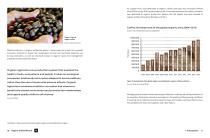
At a global level, land dedicated to organic coffee production has increased fivefold since 2004 and by 2016, approximately 8.5% of the total area used for coffee cultivation was dedicated to organic production. Mexico has the largest land area devoted to organic coffee, followed by Ethiopia and Peru. Coffee: Development of the global organic area 2004-2016 Source: FiBL-IFOAM-SOEL-Surveys 2006-2018 Figure 1. Natural organic coffee. Organic Agriculture is a production system that sustains the health of soils, ecosystems and people. It relies on ecological 700'000 Global production of organic...
Open the catalog to page 6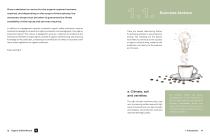
Once a decision to convert to the organic system has been reached, and depending on the scope of the business, the necessary steps must be taken to guarantee the timely availability of the inputs and services required. In addition to management capacity, successful organic coffee production requires technical knowledge of conversion to organic production and management of an organic production system. This manual is designed to serve as a reference for producers and technicians interested in exploring the universe of organic coffee farming, and acquiring knowledge of the production,...
Open the catalog to page 7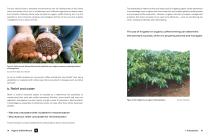
The soil should foster a favorable environment for the full development of the coffee plant root system which act in collaboration with different organisms to absorb water and nutrients. Naturally fertile soils are best for organic coffee farming, but it is still possible to build chemical, physical and biological fertility of the soil with suitable management over a period of time. The availability of water (and financial resources) for irrigating organic coffee plantations is an advantage, even in regions with low climate risk, as it enables plants to develop better and increases coffee...
Open the catalog to page 8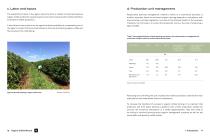
d. Production unit management The availability of labor in the region where the farm is located is important because organic coffee production usually requires more work (manual and/or mechanized) than conventional coffee production. Responsible business management, whether a family or a commercial business, is another important factor as continued organic farming depends on compliance with environmental and labor legislation, but also on the financial health of the business. Therefore, the first step is to control the production cost (i.e. the cost of producing a bag of coffee). It also...
Open the catalog to page 9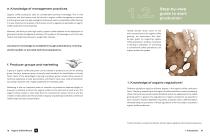
e. Knowledge of management practices Organic coffee production calls for considerable technical knowledge. This is why producers and their teams must be trained in organic coffee management practices and the agricultural and agro-ecological techniques used in sustainable coffee farming. It is also important to be aware of the various country regulations applicable to organic coffee production and processing. Moreover, the ability to yield high-quality, organic coffee depends on the application of good post-harvest management practices. The quality of the beverage is one of the key factors...
Open the catalog to page 10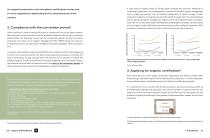
2. Compliance with the conversion period4 Once a decision is made to convert all or part of a production unit to the organic system, the producer must be compliant with the applicable regulation(s) during a conversion period before the following harvest can be considered organic. During this period, producers must draw up an Organic Management Plan (OMP) taking into account, among other factors, the inputs and management practices adopted in their production unit. A producer who wishes to apply for certification must contact a certifier at the beginning or end of the conversion period. The...
Open the catalog to page 11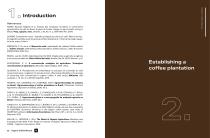
Organic Coffee Manual References: ASSAD, Eduardo Delgado et al. Impacto das mudanças climáticas no zoneamento agroclimático do café no Brasil. [Impact of climate change on agro-climatic zoning in Brazil.] Pesq. agropec. bras., Brasília, v. 39, No. 11, p. 1057-1064, Nov, 2004. CIIAGRO. Zoneamento macro - Aptidão ecológica da cultura do café. [Macro-zoning Ecologically suitable areas for growing coffee.] Available at: . MESQUITA, C. M. de et al. Manual do café: implantação de cafezais Coffea arabica L. [Coffee manual: establishing coffee plantations Coffea arabica L.] Belo Horizonte:...
Open the catalog to page 12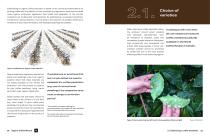
Establishing an organic coffee plantation is based on the normal recommendations for growing coffee with the addition of only chemicals and agronomic practices permitted under organic production regulations. Soil health and adaptation of the climatic conditions are fundamental considerations for establishing a successful plantation. Furthermore, special attention must be paid to the selection of suitable coffee plant varieties and ensuring only healthy, well developed seedlings are planted. When planning a coffee plantation setup, the producer should select varieties with desirable...
Open the catalog to page 13All NESPRESSO catalogs and technical brochures
-
Nespresso and Biodiversity
37 Pages
Archived catalogs
-
Coffee Sheet
2 Pages
-
Payment system
2 Pages
-
CS-2XX
2 Pages
-
CS-100
2 Pages
-
Boutique leaflet
2 Pages











